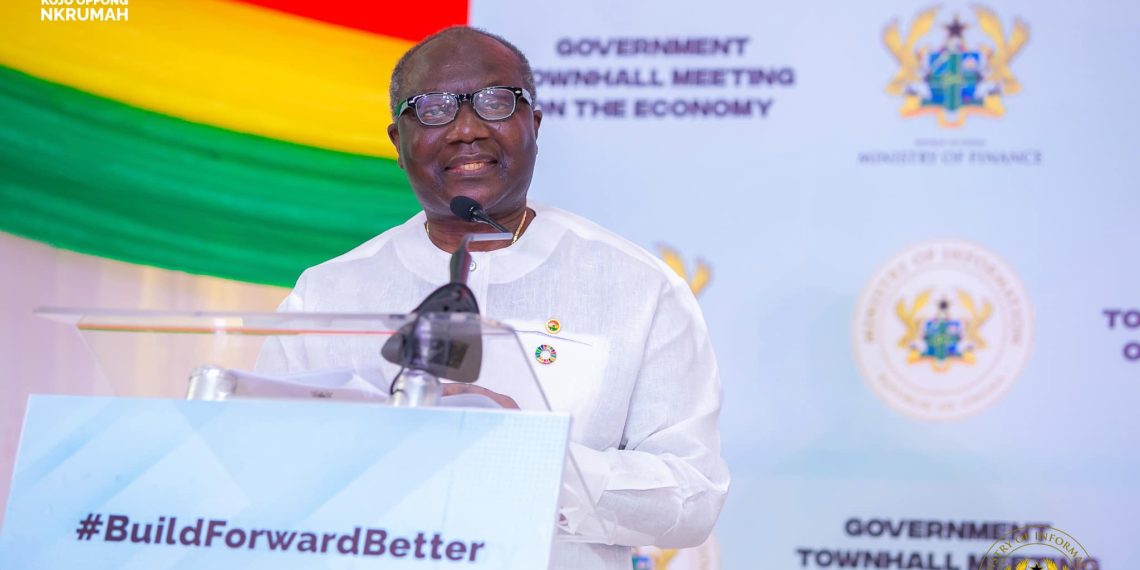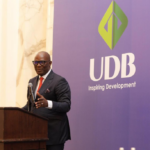Ghanaians have mounted pressure on Ken Ofori-Atta to resign as Finance Minister with his critics citing him as responsible for Ghana’s current economic challenges.
The censure motion was filed against Ofori-Atta by the minority in Parliament.
The Minority MPs made seven allegations against the minister, including frivolous spending, conflict of interest, financial recklessness leading to the free fall of the Ghana cedi, and gross mismanagement of the economy.
An eight-member ad hoc committee from both sides of the house was set up to probe the motion.
Ken Ofori-Atta has been accused of making unconstitutional withdrawals from the Consolidated Fund supposedly for the construction of the National Cathedral.
The lawmakers said he made ‘illegal’ payments of oil revenues into offshore accounts and was ‘deliberately’ and ‘dishonestly’ misreporting economic data to the Parliament.
Stating further, the Minister has been accused of fiscal recklessness leading to the crash of the Ghana Cedi which is currently the worst performing currency in the world; alarming incompetence and frightening ineptitude resulting in the collapse of the Ghanaian economy and an excruciating cost of living crisis.
Ofori-Atta is a cousin to President Nana Addo Dankwa Akufo-Addo who has shielded the former from parliamentary checks over time.
But that may not continue for long as about 80 members of the majority have joined the call for Ofori-Atta’s sack.
With this development, the finance minister may be on his way out, if the majority of legislators follow through with their demand.
Ofori-Atta, however, has a right to defend his case as the parliament debates firing him.
This comes amidst Ghana’s financial crisis and the look towards the International Monetary Fund (IMF) for a bailout.

Pulse.com.gh lists 5 controversial policies by Ken Ofori-Atta as Finance Minister.
1.5% E-levy
Introduced in May 2022, 1.5 percent E-levy tax on the transfer amount of electronic transactions.
The objective is to improve tax revenues by tapping into fast-growing digital financial services. However, many exemptions are applied to the tax design.
A daily and cumulative exemption is fixed at GH¢100 for mobile money transfers and GH¢20,000 for bank-account transfers. Digital payments to registered businesses are exempted.
There have been massive withdrawals across the country following the announcement of the policy by Ken Ofori-Atta.
The lack of adequate education is to blame for the panic withdrawals by customers.
Data published by the Bank of Ghana (BoG) revealed that the value of mobile money transactions has dropped by GH¢3.2 billion in December last year.
The value of transactions on the country’s largest payment platform decreased to GH¢82.9 billion in December from GH¢86.1 billion recorded in November 2021, representing a 3.8 percentage points decline, reports stated.
Meanwhile, the Mobile money vendors have said their businesses are on the brink of collapse due to the unwillingness of their customers to pay the E-levy.
They said the phenomenon has resulted in a significant reduction in transactions and low income, four months after the implementation of the tax measure.
The value of mobile money transactions has dropped massively following the commencement of the implementation of the E-levy.
Benchmark value
The government’s policy directive on the reversal of the reduction of values of imports on 43 selected items took effect on Tuesday, January 4, 2022, amidst opposition from the trade unions in the country.
The Ghana Revenue Authority, the Customs Division of the Ghana Revenue Authority (GRA) will ensure the directive of the 50% benchmark value reversal of import goods.
Trade unions in the country have called on the government that its decision to reverse the 50% benchmark value at the ports could adversely affect businesses.
The reversal will affect selected items from all three categories to which the reversal was applied.
These are:
- The home delivery value of vehicles
- Goods on which benchmark values are applied
- All other goods
The items to be affected include the home delivery value of vehicles, goods on which benchmark values are applied, and all other goods.
The government 2019 introduced the benchmark policy in accordance with the World Customs Organisation’s policy of regular review of valuation databases. Under this policy, certain commodities are benchmarked to the prevailing world prices as a risk management tool, to reflect the true market dynamics of these commodities. It also takes into consideration factors such as the protection of health, the environment, and security as well as the protection of local industries.
In line with the reversal, a series of engagements have been had with relevant stakeholders to reach a consensus on the implementation of the policy.
All 43 items on the list have been affected by the review.
This means the Home Delivery Value of vehicles will no longer be discounted by 30% and the full value shall apply without any reduction for all other goods, where the importer has an invoice for which the value is higher or lower than the established Transaction Price Database.
3 billion IMF loan
The administration led by President Nana Addo Dankwa Akufo-Addo took a bold decision to go to the International Monetary Fund (IMF) to seek a loan and solve the economic challenges in the country.
The government believes the country needs the IMF loan to solve the economic challenges it faces.
President Nana Addo Dankwa Akufo-Addo had previously rejected calls to seek financial assistance from the IMF but authorized the Minister of Finance Ken Ofori-Atta to take steps as Ghana faces soaring inflation.
IMF mission chief for Ghana, Carlo Sdralevich said in a statement said « Based on a request from the Ghanaian authorities, an IMF staff team will in the coming day kick-start discussions on a possible program to support Ghana’s homegrown economic policies. »
Road toll
Ken Ofori-Atta presenting the 2022 budget statement and economic policy to Ghanaians announced that the government of Ghana has proposed the abolishment of all road tolls in the country.
He said the proposal was to enhance productivity and reduce environmental pollution which is also meant to reduce heavy traffic.
He acknowledged that halting the collection of road tolls has thwarted the government’s revenue generation.
He said the decision which was hastily taken in anticipation of the passage of the 1.5% E-levy has now become a grave problem and the government is having difficulties dealing with it.
Bonds
The government of Ghana secured a total of GH¢1.9 billion from the sale of a 6-year bond and a tap issue of a 3-year bond, which was marginally undersubscribed.
The target for the sale of the two medium-term bonds was GH¢2 billion.
According to the trading results by the Bank of Ghana, the new 6-year bond raised GH¢1.32 billion at a coupon rate of 21.75%, while the 3-year bond tap offer raised GH¢606 million at a yield of 20.50%.
- GH¢923.79m secured from 5-year bond
The government in December 2021 mobilized GH¢923.79 million from the issuance of a 5-year bond, but that came at a higher cost of 21%.
The government accepted all the bids of GH¢923.79 million from the investors.
But the cost of the debt instrument was above the initial pricing guidance of 20.50%.
DataBank that Ofori-Atta owns a share used as the transaction advisor on Ghana bonds puts him [Ofori-Atta] in a conflict of interest situation.
It has been alleged that Databank and Black Star Brokerage – companies that are linked to Ofori-Atta and the former Minister of State at the Finance Ministry, Charles Adu Boahen, were selected as Bond Market Specialists for government bond issuance.
In 2018, the Supreme Court adjourned till further notice (sine die) the case in which Ken Ofori Atta, was sued over his role in the $2.25 billion bond issuance due to an alleged procedural error.
Pulse





